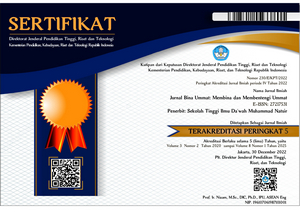THE ROLE OF DAKWAH IN COMMUNITY EMPOWERMENT IN THE INDUSTRIAL ERA 4.0
DOI:
https://doi.org/10.38214/jurnalbinaummatstidnatsir.v5i1.122Keywords:
Da'wah; Empowerment of the Ummah; Industry 4.0.Abstract
Background,Da'wah is not only lectures from the pulpit, but da'wah can also be realized through concrete actions to achieve a prosperous human life. The function of da'wah in community empowerment is about how to socialize the values ??of Islamic teachings in building the process of community change, because da'wah itself means changes to a better social self order. The author wants to describe the function of da'wah in human empowerment, which is actually part of the role of the da'i to participate in progress. Method, The research method used in this research is a qualitative method. The selection of this method is intended to find out how the data from the findings can be found, collected, processed, and analyzed. Discussion, To achieve the goals of da'wah, especially in the context of empowerment, focus, Da'wah methods and materials must be directed at the characteristics of development, namely: from: da'wah actors to the community, it will be institutionalized. Second, missionaries and the community must be closer to a common vision, because the preacher is not only responsible for transmitting but also as a bridge to facilitate the community. Third, the content of da'wah is no longer to describe community problems that need to be resolved by other parties, but rather to facilitate the community to understand itself, its problems and potential. , for social or political transitions. and the psychological aspects of what society wants. Fourth, da'wah must be able to create an atmosphere where the community has the capacity and potential to generate knowledge and analyze it. namely: from: da'wah actors to the community will be institutionalized. Second, missionaries and the community must be closer to a common vision, because the preacher is not only responsible for transmitting but also as a bridge to facilitate the community. Third, the content of da'wah is no longer to describe community problems that need to be resolved by other parties, but rather to facilitate the community to understand itself, its problems and potential. , for social or political transitions. and the psychological aspects of what society wants. Fourth, da'wah must be able to create an atmosphere where the community has the capacity and potential to generate knowledge and analyze it. namely: from: da'wah actors to the community will be institutionalized. Second, missionaries and the community must be closer to a common vision, because the preacher is not only responsible for transmitting but also as a bridge to facilitate the community. Third, the content of da'wah is no longer to describe community problems that need to be resolved by other parties, but rather to facilitate the community to understand itself, its problems and potential. , for social or political transitions. and the psychological aspects of what society wants. Fourth, da'wah must be able to create an atmosphere where the community has the capacity and potential to generate knowledge and analyze it. missionaries and the community must be closer to a common vision, because the preacher is not only responsible for transmitting but also as a bridge to facilitate the community. Third, the content of da'wah is no longer to describe community problems that need to be resolved by other parties, but rather to facilitate the community to understand itself, its problems and potential. , for social or political transitions. and the psychological aspects of what society wants. Fourth, da'wah must be able to create an atmosphere where the community has the capacity and potential to generate knowledge and analyze it. missionaries and the community must be closer to a common vision, because the preacher is not only responsible for transmitting but also as a bridge to facilitate the community. Third, the content of da'wah is no longer to describe community problems that need to be resolved by other parties, but rather to facilitate the community to understand itself, its problems and potential. , for social or political transitions. and the psychological aspects of what society wants. Fourth, da'wah must be able to create an atmosphere where the community has the capacity and potential to generate knowledge and analyze it. the content of da'wah is no longer to describe community problems that need to be resolved by other parties, but rather to facilitate the community to understand itself, its problems and potential. , for social or political transitions. and the psychological aspects of what society wants. Fourth, da'wah must be able to create an atmosphere where the community has the capacity and potential to generate knowledge and analyze it. the content of da'wah is no longer to describe community problems that need to be resolved by other parties, but rather to facilitate the community to understand itself, its problems and potential. , for social or political transitions. and the psychological aspects of what society wants. Fourth, da'wah must be able to create an atmosphere where the community has the capacity and potential to generate knowledge and analyze it.
Published
Issue
Section
This work is licensed under a Lisensi Creative Commons Atribusi 4.0 Internasional.
Authors who publish with this journal agree to the following terms:
- Authors retain copyright and grant the journal right of first publication with the work simultaneously licensed under a�Creative Commons Attribution License that allows others to share the work with an acknowledgment of the work's authorship and initial publication in this journal.
- Authors are able to enter into separate, additional contractual arrangements for the non-exclusive distribution of the journal's published version of the work (e.g., post it to an institutional repository or publish it in a book), with an acknowledgment of its initial publication in this journal.
- Authors are permitted and encouraged to post their work online (e.g., in institutional repositories or on their website) prior to and during the submission process, as it can lead to productive exchanges, as well as earlier and greater citation of published work (See�The Effect of Open Access).




